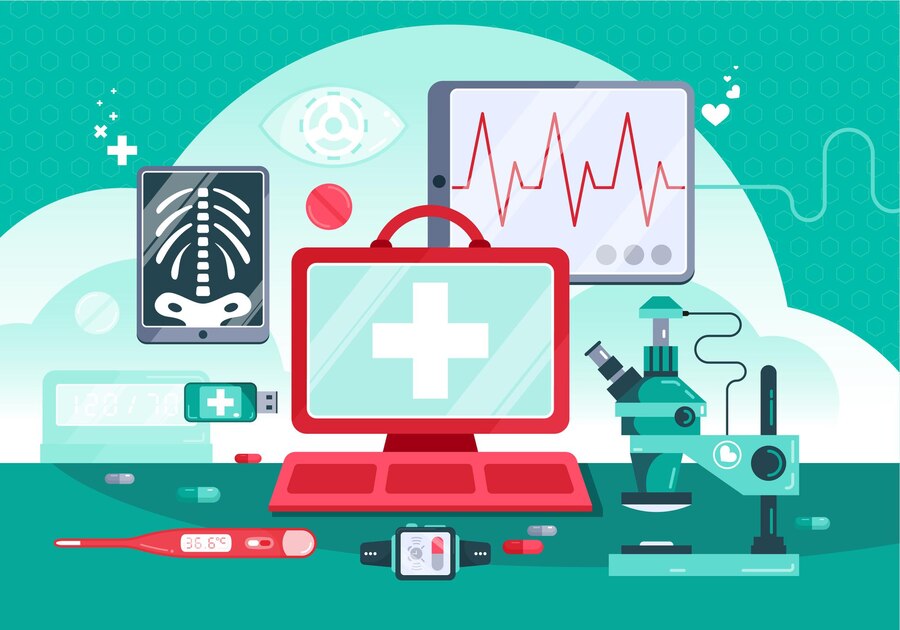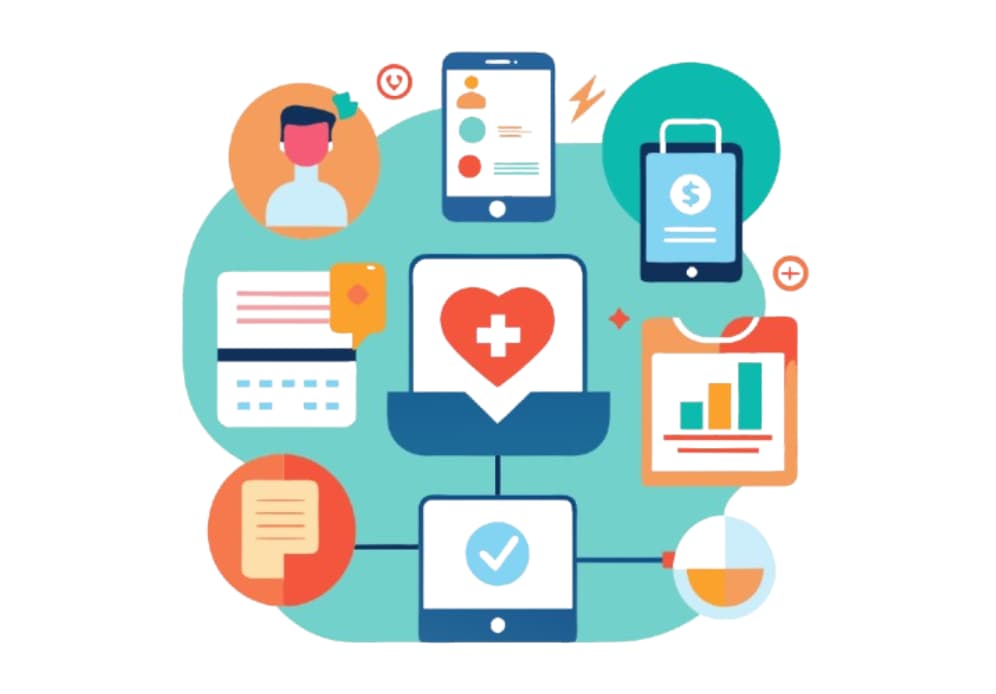The question “what is the use of computer in hospital?” leads us to an exciting exploration of how technology has transformed healthcare. Computers have become integral to hospital operations, enhancing patient care, streamlining administrative tasks, and enabling advanced medical procedures. This article delves into the key applications of computers in hospitals and the numerous benefits they offer to healthcare providers and patients alike.
1. Electronic Health Records (EHR)
One of the most significant advancements in hospital technology is the development of Electronic Health Records (EHR). EHR systems allow healthcare providers to manage patient data electronically rather than using traditional paper records.
Benefits of EHR in Hospitals:
- Instant Access to Patient Information: EHRs provide real-time access to a patient’s medical history, medications, allergies, and test results. This instant access improves decision-making and reduces the likelihood of errors.
- Improved Care Coordination: Different departments within a hospital can share patient information seamlessly, enhancing communication and collaboration among healthcare teams.
- Efficient Documentation: EHRs streamline documentation processes, allowing healthcare providers to spend more time with patients rather than managing paperwork.
EHR systems illustrate a vital use of computers in hospitals, significantly improving the quality and safety of patient care.
2. Patient Monitoring Systems
Another critical application of computers in hospitals is patient monitoring systems. These systems continuously track patients’ vital signs, such as heart rate, blood pressure, oxygen saturation, and temperature.
Importance of Patient Monitoring:
- Real-Time Data: Computers allow for continuous monitoring, providing healthcare providers with real-time data on patients’ conditions.
- Automated Alerts: Monitoring systems can automatically alert medical staff if a patient’s vital signs fall outside of normal ranges, enabling swift intervention.
- Enhanced Patient Safety: Continuous monitoring reduces the risk of complications going unnoticed, thereby enhancing overall patient safety.
The integration of computer technology in patient monitoring is crucial in critical care settings, such as Intensive Care Units (ICUs), where constant vigilance is required.
3. Telemedicine Services
Telemedicine has revolutionized how healthcare is delivered, especially in rural and underserved areas. Through computers and digital communication technologies, healthcare providers can conduct virtual consultations with patients.
Benefits of Telemedicine:
- Increased Accessibility: Patients can access healthcare services from the comfort of their homes, reducing the need for travel and long wait times.
- Convenient Follow-Up Care: Telemedicine enables easier follow-up appointments and consultations, enhancing patient satisfaction and adherence to treatment plans.
- Cost-Effectiveness: Virtual consultations can reduce costs for both patients and healthcare providers, allowing for more efficient use of resources.
The use of computer in hospital settings for telemedicine illustrates the technology’s role in expanding access to care and improving patient experiences.
4. Medical Imaging and Diagnostics
Computers play a pivotal role in medical imaging and diagnostics, providing healthcare professionals with the tools needed to visualize the internal structures of the body. Imaging technologies such as MRI, CT scans, and X-rays rely on advanced computer systems.
Advantages of Medical Imaging:
- High-Quality Images: Computers generate high-resolution images, allowing for more accurate diagnoses of conditions such as tumors, fractures, and organ abnormalities.
- Quick Analysis: The processing power of computers enables faster image analysis, leading to quicker diagnostic results and treatment plans.
- Remote Collaboration: Medical imaging files can be shared easily among specialists for consultations, enhancing collaborative care.
By utilizing computers in medical imaging, hospitals can enhance diagnostic accuracy and improve patient outcomes.
5. Robotic-Assisted Surgery
Robotic-assisted surgery represents one of the most advanced applications of computer technology in hospitals. These systems enable surgeons to perform intricate procedures with enhanced precision.
Benefits of Robotic-Assisted Surgery:
- Minimally Invasive Procedures: Robotic systems often allow for smaller incisions, leading to reduced pain, shorter recovery times, and less scarring for patients.
- Enhanced Precision: Computers enable surgeons to perform complex maneuvers with greater accuracy than traditional techniques, reducing the risk of complications.
- Improved Visualization: Robotic systems provide 3D visualization of the surgical site, allowing surgeons to see and navigate anatomy in a detailed manner.
The integration of robotics in surgery exemplifies the use of computer in hospital environments to improve surgical outcomes and enhance patient experiences.
6. Hospital Management Systems
In addition to patient care, computers are integral to the administrative side of hospital operations through Hospital Management Systems (HMS). These systems help manage various aspects of hospital operations, including scheduling, billing, and inventory management.
Key Features of Hospital Management Systems:
- Appointment Scheduling: Automated systems streamline appointment scheduling, reducing administrative workloads and minimizing scheduling conflicts.
- Billing and Insurance Processing: HMS aids in processing patient bills and insurance claims efficiently, ensuring timely reimbursement for healthcare services.
- Inventory Tracking: Computers help track medical supplies and pharmaceuticals, alerting staff when stock levels are low and ensuring that essential items are always available.
HMS demonstrates how the use of computer in hospital settings extends beyond patient care, enhancing overall operational efficiency.
7. Data Analytics for Improved Decision-Making
Computers also play a crucial role in data analytics within hospitals. By analyzing vast amounts of patient data, hospitals can identify trends, improve care, and optimize operations.
Applications of Data Analytics:
- Predictive Analytics: Computers can analyze historical patient data to predict future health outcomes, helping healthcare providers intervene proactively.
- Quality Improvement: Data analytics allows hospitals to identify areas for improvement in patient care processes and outcomes.
- Resource Allocation: By analyzing patient flow and resource utilization, hospitals can optimize staffing and resource allocation to improve efficiency.
The ability to analyze data effectively showcases another significant use of computer in hospital settings, empowering hospitals to make informed decisions that enhance patient care.
Conclusion
The use of computer in hospital environments has revolutionized healthcare delivery, transforming patient care, administrative efficiency, and diagnostic accuracy. From electronic health records and patient monitoring systems to telemedicine and robotic-assisted surgeries, computers are integral to modern healthcare.
As technology continues to evolve, hospitals will increasingly rely on computer systems to enhance patient outcomes, streamline operations, and improve the overall quality of care. Embracing these advancements ensures that hospitals can meet the growing demands of patients while providing high-quality, efficient healthcare services.
Q: How do computers improve patient care in hospitals?
A: Computers enhance patient care by managing electronic health records, monitoring vital signs, facilitating telemedicine, and enabling accurate diagnostics.
Q: What role do computers play in telemedicine?
A: Computers enable virtual consultations, increasing accessibility to healthcare services and making follow-up care more convenient for patients.
Q: How does medical imaging benefit from computer technology?
A: Computers generate high-resolution images for accurate diagnostics and enable quick analysis, improving the speed and quality of patient care.
Q: What is the importance of hospital management systems?
A: Hospital management systems streamline administrative tasks like scheduling and billing, allowing healthcare providers to focus more on patient care.
Q: How can data analytics improve hospital operations?
A: Data analytics allows hospitals to identify trends, predict outcomes, and optimize resource allocation, leading to improved efficiency and patient care.






